- Home
- Claire North
84k Page 3
84k Read online
Page 3
Once she’d had a tomato plant uprooted and thrown into the canal. She’d found the sodden tendrils of broken leaves bumping against her hull in the morning, and she’d cried, howled almost, like her one true love was dead, and couldn’t stop crying for the best part of a week.
Now she felt nothing. That too was why she’d come to the water, to get from that place to somewhere else.
She put some margarine into the baked beans and ate silently, sitting on a green foldable chair that in summer months she liked to have on the prow so she could read by the light of the fading day. She wondered if she should wake the man, and decided not to. She thought maybe she should give him some water, soak a sponge or something, try to dribble something into the corner of his drooping mouth, but thought he might choke.
She tried calling the local hospital, but the automated switchboard wouldn’t let her proceed without inputting her eleven-digit insurance provider number, so she gave up.
At 3.30 p.m., as the sun slipped towards the horizon, she muttered, “Screw it,” gunned the engine, retrieved her mooring hooks and steered the Hector north, towards Watford and the edge of the city, blue-grey fields to the left, shining black road to the right.
By 6 p.m. the canal was dark, her fingers cold and body stiff, so she went back inside. She had enough gas and water for a hot shower, but the idea of stripping naked with an unknown man in the cabin made her uneasy. Instead she made more tea and, as the man slept, she checked his hands again for truths and signs, and found there nothing she had not found before.
At 8.23 p.m. a cormorant, confused, lost, slams into the side of the canal boat, indignant that its journey has been disrupted by so solid a thing, and at its collision
the man called Theo jerks awake, and for a moment is terrified, and cannot remember his name, and does not know where he is, and wonders if this is what every awakening will be like for the rest of his days.
Clawing, pulling the blanket tight, then flinching, turning away from the pain, another moment of uncertainty as he tries to work out where it comes from—it would be unmanly to whimper at this point but screw it, he’s only just woken and this was not how he planned on finding himself.
A cabin.
If he rolled out sideways his head could touch one wall, his feet the other, at a stretch. He might have to cheat and reach out a few fingertips, but that’s fine. If he lies down lengthwise, the boat can probably fit six or seven of him end to end before it becomes a squeeze. A curtain above his head, purple, with a silver elephant on it, the moon, or possibly the sun, or maybe just a disc of light, rising or setting behind the ambling creature, a log curled in its trunk, lilies crushed beneath its feet. The curtain is suspended by a mesh of elastic rope, a parting in the middle. On the other side of the cabin, away from the sofa, a cubicle closed off from the rest of the boat by heavy plastic doors that fold like an accordion to create a little privacy, concealing a toilet. A tomb-sized cupboard next to that encloses a plastic shower.
Black iron stove, burning bright and loud, with two hobs set on top, one for a kettle, one for a pan. A gas oven too small to roast a chicken. Cupboards above made of laminated chipboard, the handles removed in an act of domestic whimsy, replaced with hand-painted ceramic baubles of blue and yellow. A small stainless-steel sink, a saucepan and cup drying beside it. On the walls of the cabin, little hand-sewn pieces of fabric adorned with blue-stitched cornflowers, red hearts, messages of love. “Believe in yourself.” “Love thy neighbour.” “Life is for living.” And so on. One, circled by a weave of red roses and green thorns, framed and put between portholes, a little out of keeping with the others—“Deal with it, bitches”—in the same carefully embroidered hand. Round portholes covered with handmade foil circles, glued to cardboard and pressed against the glass. A clock on the wall counted away the hours. The numerals were embraced with happy, bounding rabbits. Here, a bunny balancing on the top of the 5, hugging the 8, pressed up against one o’clock in a pose which, once suggested as needlessly sexual, could be nothing else, all innocence gone.
A fold-down slatted wooden table for eating on. The couch he lay on, extending down towards the rear of the boat; more cupboards, installed a little crooked at first, then straightened up through careful addition of nails and wedges. A lampshade above his head on which ducks flew in an endless circle, eyes wide and terrified at the philosophical prison of their flight. Darkness outside, yellow light within, a few bulbs burning in the walls, candles lit on the kitchen counter, floating in white metal bowls.
The man called Theo clings to his blanket, to the back of the couch, to his side, to his head, and can’t quite remember how he came to be here, and as sense returns, for a moment entertains the possibility that he is dead, and the Greeks were right, and the rivers of the damned flow through Hades after all.
Then Neila came through the curtains that separated the cabin from her bed, disturbed by the sound of movement, and saw him, and said, “Oh.”
For a frozen moment they stared at each other and hadn’t got a clue what they were meant to say next.
Then, in almost harmony, he blurted:
“I don’t know if there …”
And she exclaimed, “You must be parched. Tea?”
Two people on a narrowboat, heading up the Grand Union Canal.
Neila makes tea.
She is six foot three, feeling less than her radiant self, wearing furry lion slippers, thick flannel pyjama trousers, a cyan-blue T-shirt, a fleece jumper given to her by someone who was hoping to also give her Jesus. Her hair is turning grey; she hasn’t had a proper haircut for a while, and the cheap DIY dyes turn the long ends brittle. There’s still a red sequin dress in her cupboard, knee-high boots so bright that they dazzle passing traffic. She hasn’t worn either for a long time, and her bum and belly have got a little saggy. Sometimes she feels sad about that, and instantly tells herself to get over such stupid thoughts and appreciate her beauty for what it is. Her arms are strong, her shoulders broad, and she hides both from the gaze of men. Even though she’s tall, she likes to wear a bit of a heel when she goes walking, to change the shape of her calves and the way her hips move. It helps; so does the lipstick.
Tonight she wears neither, and feels hot, exposed and foolish.
Fusses over making a cup of tea, puts in too much UHT milk, decides she’ll drink that cup herself rather than throw it away, tries again, teabag, water, strange how hard these things become in the gaze of a stranger’s eye, and as she works she says:
“You were by the canal. I called an ambulance. They didn’t come. I don’t know if I did the right thing, if there is family—do you have family?” The man didn’t answer. “I moved the boat. I was by the lock, there are …”
She stopped talking as quickly as she had begun. Beat the teaspoon out on the side of the mug. The sound was painfully loud, irritating; once upon a time she’d found it relaxing, ping-ping-ping! Not tonight.
Silence from the couch. She passed him a mug, and maybe he said thank you, his lips moved and there was air in his throat, but the sound didn’t quite come out whole. She cast around for something else to do, putting a saucepan away, poking at the fire in the stove, still burning strong but who cares, more wood, do excuse me I’m just going to …
more wood, taken from the pile under the tarp on top of the deck, her breath frozen in the air, the cold a sudden shock that lets her feel how fast her heart is pumping …
a moment to catch the chill, letting the cold through her skin, taking her time grasping the log, enjoying the feel of it beneath her fingers, broken bark and dry splinters
then back in.
More wood.
Well isn’t that lovely it’s just
it’s just
Well.
She stood, silent, and found she had nothing more to say.
The man, dark hair, one side clumped with blood, stuck with dirt, a damn good wash and then whoosh, a static explosion around the head, she knows how hair like that be
haves she used to cut the hair of a man called …
… a man called …
It was a long time ago.
Several weeks’ growth of scraggy beard, eyes made smaller by the puffy lids that encase them. He was born with a harelip, which a doctor stitched together before he was six weeks old so that he could feed; you’d barely notice the scar, but there is a slight tugging to one side of his face, a slightly crooked smile when it appears, which hasn’t been very often in recent years.
He was also born with the little finger and ring finger on his right hand fused together, but his parents never told him that, and it was an easy operation to separate them. His mother thought it was bad luck, an evil birth. His mother was not the kind of woman to be swayed once a thought was in her mind.
“My name is Neila.”
The words were so obvious, so familiar on her lips, she was astonished she hadn’t said them before.
Silence.
She turned, her whole body now, to look at the man on the couch. Still clutching the blanket. Staring up at her, eyes catching green-grey in the firelight. She put her head on one side, hands on her hips, waited.
“Theo,” he mumbled at last. “My name is Theo.”
Then hesitated, looked away, smiled, laughed, found laughing painful, curled away from the sound, looked back up, still smiling. “Actually,” he said, “that’s a complete and utter lie. Sorry. Habit. But … call me Theo.”
Silence in the cabin.
Silence on the water.
Neila watches and feels a sudden heady rush of power. This man is the most vulnerable, pathetic creature she has ever seen. She is a saving angel. She is God-like in her authority. She holds another person’s life in her hands. She’s never done that before.
She thinks she might laugh, and it would be deeply inappropriate. Involuntarily puts one hand over her mouth, clapping the sound in.
Then she thinks she might cry, and that would be absolutely fucking ridiculous, what the fuck is she even thinking?
The man called Theo is contemplating his next words, staring into his teacup, barely sipped, maybe he’s a snob about these things, maybe he doesn’t like …
“There’s a code,” she blurted to stop him before he could say something stupid, something that would destroy this knife-edged moment in which she is in charge, and all things hang in the balance. “On the canal. There’s a code. You help people. That’s what it is. Not many people stick with it now. You get a lot more rude people. People who don’t know their boats. Triple-parking wankers, if you don’t mind me saying. But I believe in the code. It’s why I’m on the water, it’s why …”
Stopped.
Worried she’d said too much. Tried to replay her words, thought perhaps they were okay.
“There’s a code,” she repeated into the silence. “That’s the way of things.”
The man nodded, taking it in, looked down, looked up, looked into her eyes. Said: “I’m going north to destroy a man. He killed my friends and took my daughter. He broke the country. He’s why they’re all dead.” His face scrunched up for a moment, looking for something else, which he couldn’t find. “That’s all.”
She thought about it.
Was surprisingly okay with just standing and being still and quiet and thinking about it.
Heard the clock ticking down towards a rabbity midnight.
Said: “Okay then. That’s okay.”
That was that.
Chapter 7
Theo walked through autumn streets with Dani, watching the cracks in the pavement, and had nothing to say for himself.
Dani strode, chin forward, glowering at all who dared look her way, fingers in fists at her side. The sun was setting, a sluggish grey-blue drifting to sodium-brown. The streets were padded in quiet autumn hush, traffic muffled and far away.
Frames of a film caught in office windows: women picking up their coats, two men playing ping-pong at the staff table above the reception area. The cleaners starting work, down from the top, buckets on wheels, sprays in a pouch, computer screens still live, the lights never going out. A queue for an ATM, a shop assistant pulling down the shutters on a wall of leather boots.
Laughter from the pubs.
A smile and a friendly nod from the man who guards the door of the strip club, hey mate, good to see you again, come in come in yes your favourite she’s dancing tonight she’s something else isn’t she?
The buses do not stop to let people on. If you didn’t prebook your place through the gold priority transport service, there’s no chance tonight. Faces pressed to fortified glass, bodies standing right up front in that sacred place where only the driver should be, people up the stairwell, standing on the upper deck, unless someone gets off no one is getting on …
No one gets off.
Company Police move a beggar on. He has an abscess in his left leg that he proudly displays, destroyed bright pink flesh hollowed out almost to the bone, yellow fluid seeping slowly round the edges. When he just laughs in their faces, refuses to move, points and cackles, the security men carry him bodily to their truck, throw him in. He’ll be for the suburbs, for the enclaves where the good people don’t go, where they stopped the electricity after the scroungers couldn’t pay, wouldn’t pay, and where corporate councils don’t see any need to invest.
Or maybe not. Maybe he’s for somewhere else entirely. There’s no one around who’ll ask, fewer who’ll care, not for a man like that. He makes people uncomfortable. He seems to like it. That’s basically assault, that is. That’s £125 for the initial crime plus £50 for malicious intent and …
Two men are on the verge of hitting each other over a taxi. The driver sits, meter running, unperturbed, as the men scream “I was here first I was here it was me I was—”
“He answered my flag it was me I waved him down didn’t you see are you blind?”
Both men are heading towards Maida Vale. If they could just stop shouting for a minute, they could probably share the ride.
They went to a café. The café served coronation chicken, bacon and egg, egg mayo and cheese and pickle sandwiches. If you wanted anything else, the woman behind the counter tilted her mighty brow down and stared up from beneath its shadows, daring you to stick to your convictions. When you backed down, she tutted and exclaimed that you were being absurd and made it anyway, righteously going out of her way for the difficult customer despite their protestations that egg mayo was fine honest, and guessed at the price, which was usually £6.99. The woman used to be a teacher, but her students complained that she gave them too much homework, and one day she hit a boy who had punched staples into a girl’s arm and couldn’t afford to pay the indemnity, and here she is. Theo bought coffee. He used what cash he had, and as the woman fussed with the till, he slipped the battery from his phone and tried not to stare back over his shoulder as Dani settled at a beige Formica table carved with messages of love and abuse from strangers, scratched with the prongs of a fork.
He sat opposite.
Drank coffee.
Dani said, “So there was”
And the man called Theo replied, “It’s been a really long”
She cut in: “I’ve been on the patty line.”
They sipped coffee in silence. It was far too hot and better than he’d expected. In the silence Theo whispered sorry, I’m sorry to hear that, that sounds …
… but his mouth was smarter than his brain, and he looked down at his tea and said nothing at all.
“After you left … the town, there was—I mean, the factory closed. And there wasn’t much of nothing else left and I got
it got bad.
I had to
I mean, yeah, you’re not supposed to say that, you never had to. You chose to. You chose to steal, that’s what they always said, but I couldn’t see any other way to
Look. That’s not what matters. I’m out now. I got in, and things got bad, and I’m clean now. I’m clean and
so.
So.”
>
She ran the curve of the teaspoon over a bowl of sugar, flattening the surface to a smooth plateau, then heaping it up into a hill, then squashing the hill back down again. He watched, waited. In a moment of decision she drove the spoon down into the centre of the bowl, standing tail upright, and stared into his eyes.
“I’ve got this boss,” she announced, tumour-factual, tombstone-hard. “Gatesman. He’s my probation officer, but he also gets 5 per cent of whatever I make. It’s how they motivate him to try real hard to get us girls jobs. Best jobs are sex, but I got the dirt on him. Embezzling. Not from us—we’re fair game. But from his bosses, naughty. I got dirt, and now he’s fucking scared of me. He’s scared and I can ask for any job I want, and I said—I want into the Ministry. Get me into the Ministry, or I’ll … but he did. He got me inside. I’ve got this thing I need to do, and it’s hard but it is …
And then I saw you. You and your stupid pudding face.
And I thought …
So. Your name is Theo now. And you work for the Ministry.”
In the half-light of the candles burning on the kitchen counter of the narrowboat called Hector, the woman whose name now is Neila squats down before the man called Theo as you might hunker down to seem less frightening to a tiny, cowering cat, and hands out, fingers open, murmurs, “I read somewhere that you shouldn’t change the dressing, just put more stuff on top until it stops bleeding.”
Drinking coffee from a dirty cup on a dirty table, the man called Theo looked up and met Dani’s eye for almost the first time in fifteen years, and knew that his world was probably going to end. “What do you want?”
“You have access to stuff. With your job, with computers, you can find things out.”
“I don’t just …”
“There’s someone you gotta find for me.”
“Why?”
She smiled, tiny teeth flashing between pale lips. “Cos I’m your oldest, bestest friend, and I’m asking.”

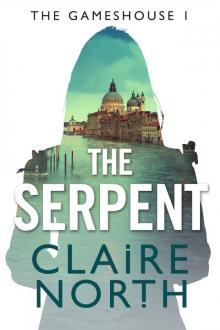 Gamehouse 01 - The Serpent
Gamehouse 01 - The Serpent The Master
The Master Gamehouse 03 - The Master
Gamehouse 03 - The Master The Thief
The Thief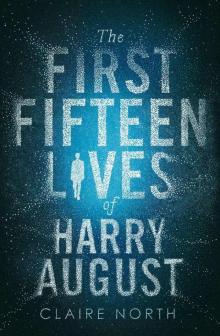 The First Fifteen Lives of Harry August
The First Fifteen Lives of Harry August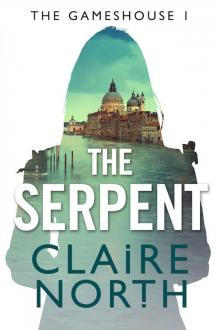 The Serpent
The Serpent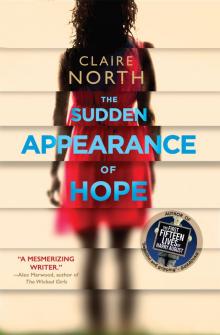 The Sudden Appearance of Hope
The Sudden Appearance of Hope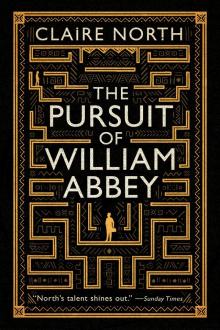 The Pursuit of William Abbey
The Pursuit of William Abbey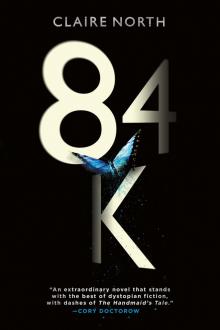 84k
84k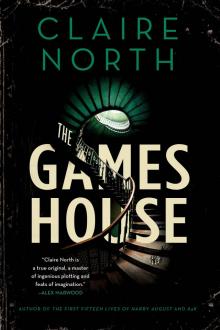 The Gameshouse
The Gameshouse Touch
Touch Sweet Harmony
Sweet Harmony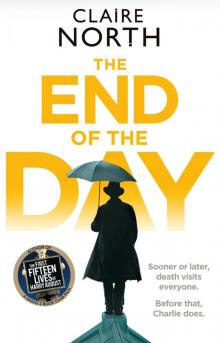 The End of the Day
The End of the Day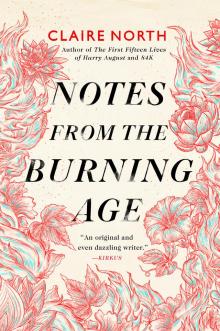 Notes from the Burning Age
Notes from the Burning Age